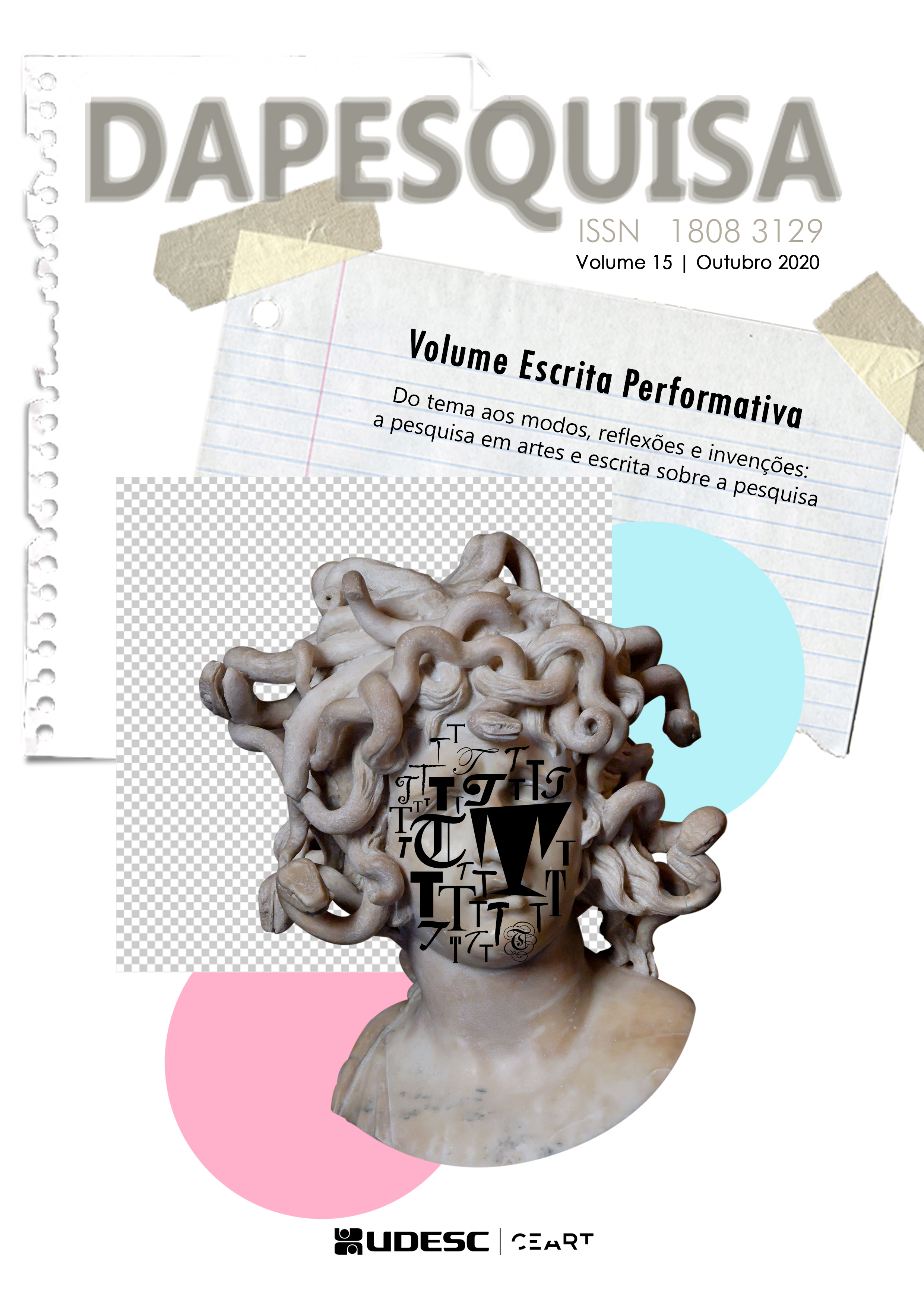Cartas entre artistas pesquisadoras professoras
DOI:
https://doi.org/10.5965/1808312915252020e0018Palavras-chave:
Artes na educação, Escrita e arte, Ensino-Metodologia, Performance (Arte)Resumo
Uma conversa, um compartilhar experiências. Este texto é um conjunto de três cartas entre pesquisadoras-artistas-professoras. Estela escreveu a primeira delas relatando sua experiência como professora-artista em busca de pedagogias da performance. O formato de sua carta suscitou o desejo de diálogo entre outras mulheres cuja experiência era semelhante. Sendo assim, Ines, Juliana e Raquel dispuseram-se a respondê-la falando sobre suas metodologias e refletindo sobre os desafios que enfrentam nas salas de aula da escola, da universidade e do instituto federal. Além de serem pesquisadoras-artistas-professoras, entrelaçam-se os interesses no campo da performance e da dança seja pensando na cena, no ensino-aprendizagem ou nas possibilidades de escrita acadêmica.Downloads
Referências
BAITELLO JUNIOR, N. O Pensamento Sentado: sobre glúteos, cadeiras e imagens. São Leopoldo: Editora Unisinos, 2012.
BASBAUM, R. Amo os artistas-etc. In: MOURA, R. (org.). Políticas institucionais, práticas curatoriais. Belo Horizonte: Museu de Arte da Pampulha, 2005. Disponível em: https://rbtxt.files. wordpress.com/2009/09/artista_etc.pdf. Acesso em: 14 de nov. 2019.
CIOTTI, N. O professor-performer. Natal: EDUFRN, 2014.
ALICE, T. O Re-Enactment como Prática Artística e Pedagógica no Brasil. Revista e-misférica, New York, v. 8, n. 1, 2011. Disponível em: http://archive.hemisphericinstitute.org/hemi/pt/e-misferica-81/alice. Acesso em: 21 set. 2016.
BONDÍA, J. L. Notas sobre a experiência e o saber de experiência. Revista Brasileira de Educação, Rio de Janeiro, n. 19, p. 20-28, jan./abr. 2002. DOI: https://doi.org/10.1590/S1413-24782002000 100003 . Disponível em: https://doi.org/10.1590/S1413-24782002000100003. Acesso em: 5 ago. 2011.
FABIÃO, E. Performance e teatro: poéticas e políticas da cena contemporânea. Sala Preta, São Paulo, v. 8, p. 235-246, 2008. DOI: https://doi.org/10.11606/issn.2238-3867.v8i0p235-246. Disponível em: http://www.revistas.usp.br/salapreta/article/view/57373. Acesso em: 31 mar. 2014.
FABIÃO, E. Programa performativo: o corpo-em-experiência. ILINX-Revista do LUME, Campinas, n. 4, dez. 2013. Disponível em: https://www.cocen.unicamp.br/revistadigital/index.php/lume/article/ view/276. Acesso em: 12 jun. 2013.
LIMA, A. P. F. de C. Fluxus em museus: museus em fluxus. 2009. Tese (Doutorado em História da Arte) - Instituto de Filosofia e Ciências Humanas, Universidade Estadual de Campinas, Campinas, 2009. Disponível em: http://www.repositorio.unicamp.br/handle/REPOSIP/280776. Acesso em: 25 jun. 2012.
PINEAU, E. L. Critical Performative Pedagogy: Fleshing out the politics of liberation education. In: STUCKY, N.; WIMMER, C. (ed.) .Teaching Performance Studies. U.S.A. : Southern Illinois University, 2002. p.41-54.
PINEAU, E. L. Nos Cruzamentos entre a performance e a Pedagogia: uma revisão prospectiva. Revista Educação e Realidade, Porto Alegre, v. 35 n. 2, p. 89-113, maio/ago. 2010. Disponível em: https://seer.ufrgs.br/educacaoerealidade/article/view/14416 . Acesso em: 22 de jan. 2020.
RACHEL, D. P. Adote um artista, não deixe ele virar professor. São Paulo: Cultura Acadêmica, 2014.
TAYLOR, D. O arquivo e o repertório: performance e memória cultural nas Américas. Belo Horizonte: Editora UFMG, 2013.
TEIXEIRA, T. C. A arte da performance na escola pública: estudo de casos sobre os sentidos da subversão no universo escolar. 2019. Dissertação (Mestrado em Teoria e Prática do Teatro) - Escola de Comunicações e Artes, Universidade de São Paulo, São Paulo, 2019. DOI: https://doi.org/10.11 606/D.27.019.tde-24092019-163910. Disponível em: https://www.teses.usp.br/teses/disponiveis/ 27/27156/tde-24092019-163910/pt-br.php. Acesso em: 14 nov. 2019.
Publicado
Como Citar
Edição
Seção
Licença
Copyright (c) 2020 Estela Vale Villegas, Ines Saber de Mello, Juliana Lima Liconti, Raquel Purper

Este trabalho está licenciado sob uma licença Creative Commons Attribution 4.0 International License.
Autores que publicam nesta revista concordam com os seguintes termos:
Autores mantém os direitos autorais e concedem à revista o direito de primeira publicação, com o trabalho simultaneamente licenciado sob a Licença Creative Commons Atribuição 4.0 Internacional, a qual permite que outros distribuam, remixem, adaptem e criem a partir do seu trabalho, mesmo para fins comerciais, desde que lhe atribuam o devido crédito pela criação original, reconhecendo a autoria e publicação inicial nesta revista.
A DAPesquisa, segue as recomendações do movimento de Acesso Aberto, proporciona acesso público a todo seu conteúdo, a partir do princípio de que tornar gratuito o acesso a pesquisas gera um maior intercâmbio global de conhecimento.
Plágio, em todas as suas formas, constitui um comportamento antiético de publicação e é inaceitável. A revista DAPesquisa utiliza o software iThenticate de controle de similaridade.





